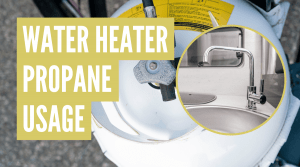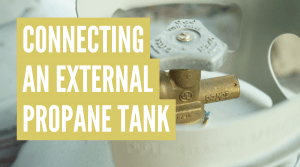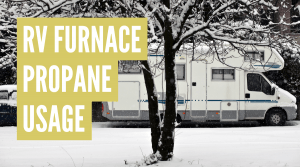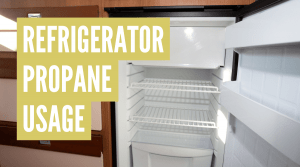Camper FAQs is reader-supported. Buying through links on our site may earn us an affiliate commission. As an Amazon Associate I earn from qualifying purchases.
Propane leaks not only cost you money but can also be life-threatening.
This is why using a quality, reliable propane detector is extremely important and should not be overlooked.
Below, we review and compare three of the best RV propane detector models on the market today. Plus, give you tips on choosing the best model and properly maintaining it.
RV Propane Detector Comparison
*Buying through links in this chart may earn us a commission at no additional cost to you.
Safe T Alert 20-441-P-BL Mini Hard-Wired Propane/LP Gas Alarm
- Best Overall
MTI Industries’ 20-441-P Safe T Alert 20 Series Propane and LP Gas Alarm wins the best overall spot in my round-up of the best RV propane detectors.
This rugged RV propane detector can handle all types of campers and motorhomes, including fifth wheels, hardshell campers, travel trailers, etc.
The built-in advanced technology includes a rapid recovery sensor that resets when muted and reactivates if dangerous propane levels remain in your vehicle.
This Safe-T-Alert RV propane gas detector features easy 12-volt installation and comes with a mounting bracket. And you can rest easy knowing it meets all RVIA and NFPA certification requirements.
Key Features
- Convenient alarm mute button
- Safe operating temperature of -40 to 158 degrees Fahrenheit
- Alarm picks up <25% LEL of propane and methane
- Rapid recovery sensor resets the unit when silenced
- Unit is white for easy identification
Specifications
- Brand: Safe T Alert
- Power Supply: 12 volts, direct current
- Dimensions: 3.5″W x 2.5″H x 1.25″D
- Weight: 4.8 ounces
- UL Listed: Yes
- Warranty: 1-year limited
Pros
- Included mounting bracket for easy installation
- 12-volt installation – no missing or dead batteries to worry about
- The minimalist display is easy to read
Cons
- The life of these units is 5 years, which is half of the Dometic models below.

Safe T Alert 20-441-P-BL Mini Hard-Wired Propane/LP Gas Alarm
Price:Clicking this link to make a purchase may earn us a commission at no additional cost to you.
MTI Industries Safe T Alert 30-442-P Propane Gas Alarm
- Best Value
The winner for “best value” in our round-up of this year’s best RV propane gas detectors is MTI’s 30-442-P model.
For a few more dollars than the 20 series, you get the same reliable technology plus an innovative circuitry system designed to conserve energy and a maintenance-free, self-cleaning sensor. Plus, it can be flush-mounted for a more professional look.
As a bonus, this unit will fit onto the mounting brackets for many other RV propane detectors.
Key Features
- Designed for use in all types of RVs and campers
- Unit designed with a flush mount for easy installation
- Unit is white for easy identification
- The alarm is 85 decibels in volume
- UL/RVIA/NFPA certified
Specifications
- Brand: Safe T Alert
- Power Supply: 12 volts, direct current
- Dimensions: 1.25″ x 2.87″ x 6″
- Weight: 7.2 ounces
- UL Listed: Yes
- Warranty: 1-year limited
Pros
- This unit is an ideal replacement for older RV propane detectors
- Updated display and color is an improvement over older units
- The unit will fit other manufacturers’ mounting brackets
- Self-cleaning sensor
- Can be flush mounted
Cons
- Reports of units not going off when exposed to propane
- Some customers received two-year-old units (most likely an issue with the Amazon seller, not the manufacturer)

MTI Industries 30-442-P Propane Gas Alarm
Price:Clicking this link to make a purchase may earn us a commission at no additional cost to you.
Dometic Dual LPCO Combination Alarm
- Honorable Mention
The last RV propane gas detector that made the list is the Dometic Dual LPCO Combination Alarm. These alarms are formerly owned by Atwood, which was bought out by Dometic, hence why it still says Atwood on the alarms.
This detector is specifically designed to detect both liquefied petroleum (LP) and carbon monoxide (CO) gases using patented fuel cell technology, which, according to them, offers more accurate and reliable gas detection.
The long-lasting 10-year life of this detector is a significant plus. It means not worrying about frequent replacements or maintenance, which is a relief for any RV owner.
Key Features
- Long-lasting 10-year life
- Meets all the necessary safety standards set by UL (Underwriters Laboratories)
- Audio and visual alerts
- Available in black or white
Specifications
- Brand: Dometic
- Power Supply: 12-volt, direct current
- Dimensions: 2″ x5″ x 5″
- UL Listed: Yes
- Warranty: 2-year limited
Pros
- The compact unit is easy to install
- Unit is bright and easy to interpret
- Good replacement for older units
Cons
- The biggest complaint is that reviewers thought they were getting a Dometic, but got an Atwood. But, again, Dometic bought Atwood. I’m not sure if they plan to replace the branding on these units or not.

Dometic Dual LPCO Combination Alarm
Price:Clicking this link to make a purchase may earn us a commission at no additional cost to you.
What to Look for When Buying an RV Propane Detector
If you’re shopping around for the best RV propane detector to keep your family safe while out on the road, then there are quite a few things to consider.
There are several different models of RV propane detectors, each with different features, so we’ve put this section together to give you some idea of what all those important features and measurements mean.
Safety Certifications
When looking for a high-quality RV propane detector, you will read a lot about the different safety certifications associated with these devices. There are three essential certifications to look for when shopping for an RV propane detector.
1. UL Certification
You’ve probably noticed the small “UL” logo on your RV propane detector, your fridge, your stereo, or even your children’s toys. That UL stands for Underwriter Laboratories. Underwriter Laboratories is a privately-owned corporation that has made a name for itself by testing and verifying the safety of millions of household products you use every day.
2. RVIA
The Recreational Vehicle Industry Association issues the RVIA Certification. When you see an RV propane detector with an RVIA certification, it means that the unit passes the RVIA’s rigorous safety protocols and is safe to use by industry experts. The RVIA works with RV manufacturers to keep travelers safe on America’s highways.
3. NFPA
The National Fire Protection Association issues the NFPA Certification. The NFPA is a professional organization that develops codes and compliance protocols to ensure that buildings and products are safe from fire and electrical issues. The NFPA has created thousands of certifications on countless products to keep consumers safe.All RV propane gas detectors that made our list are UL certified.
While the UL (Underwriter Laboratories) certification is essential, a quality RV propane gas detector will also meet the RVIA and NFPA requirements.
End of Life
Most RV propane gas detectors have a lifespan of five to seven years. If an RV propane gas detector is older than this, you should consider the unit unreliable and replace the defective unit as soon as possible.
When purchasing an RV propane gas detector, consult the instructions and find the date of manufacture for your RV propane gas detector. The date is usually stamped on the detector itself. I recommend checking this date before buying to ensure it still has plenty of life left.
Alarm Decibels
In many ways, this is the essential feature to consider when shopping around for the best RV propane detector. For your family’s safety, an RV propane detector should have an alarm tone that is loud enough to wake up and alert everyone in the RV.
When trying to get a sense of how loud your RV propane detector is, remember that the best RV propane detectors have an alarm tone of at least 80 decibels, the same noise level as a power lawnmower or a noisy restaurant. In the interest of safety, remember that anything over 85 decibels is dangerous to your hearing.
Indicator Lights
When purchasing an RV propane detector, look for a unit with visible indicator lights providing clear visual proof that the propane detector unit is powered on and functioning correctly. Typically, a propane detector will have a green indicator light for regular operation and a red indicator light for a problem.
And choose an RV propane detector with an end-of-life notification that will tell you when your RV propane detector has reached the end of its lifespan and needs a replacement.
Multiple Gas Leak Detection
Traveling in an RV, the other potentially dangerous gas you’re going to encounter is carbon monoxide. If you already have a separate carbon monoxide detector, then you are fine. But they do make dual detectors that can detect both LP gas and carbon monoxide.

MTI Industries Safe-T-Alert 35 Series Dual LP/CO Alarm
Price:Clicking this link to make a purchase may earn us a commission at no additional cost to you.
Warranty
Another factor that you should consider when looking for the best RV propane detector for your family is the type of warranty offered by the manufacturer.
When it comes to RV propane detectors, most manufacturers offer a basic warranty covering problems for up to 2 years, while other manufacturers offer immediate refunds for defective units.
Key Takeaways
When you’re looking for the best RV propane detector to keep your family safe while you’re traveling the country in your motorhome, remember that you’re going to rely on this device to ensure your family’s safety for years to come.
To summarize, find a unit that meets the following criteria:
- Choose a detector from a manufacturer you can trust. MTI Industries and Atwood are two of the most reliable and trusted brands today. They both meet all essential certifications and requirements (UL, RVIA, and NFPA).
- Choose an RV propane detector that is easy to understand and interpret. The detector should have clear indicator lights (preferably red and green) that let you know the unit functions correctly.
- The alarm decibels should be loud enough for you and any other vehicle inhabitants to hear clearly. 80 to 85 decibels is the sweet spot.
- Make sure your RV propane detector also has a clear end-of-life alert, so you know when to replace the unit. At the very least, it should have a date stamped on the unit.
- A solid warranty of at least 1-year will indicate the manufacturer stands behind its product.
- Optional: Choose a unit that can detect multiple gasses, such as propane and carbon monoxide.
FAQs
Where Do You Mount a Propane Detector in an RV?
When mounting an RV propane detector, place the unit between ¼ of a foot to ½ of a foot from the floor of your RV. Remember that propane is heavier than air, so it’s better to mount an RV propane detector closer to the ground so that the unit can pick up propane fumes in your RV as quickly as possible.
How Long Do RV Propane Detectors Last?
Most RV propane gas detectors have a shelf life of five to seven years before replacement is necessary. The date should be stamped on the unit itself.
When shopping around for the best RV propane detector, make sure you purchase a unit with an end-of-life alert that will tell you when it’s time for you to replace your detector.
When you’re setting up your RV propane detector, make sure you read the manufacturer’s instructions to know exactly what your model’s end-of-life alert sounds like. It’s also a good idea to make sure you know exactly how to replace your unit once it’s started emitting an end-of-life alert.
How Do You Test an RV Propane Alarm?
To test your RV propane alarm, follow these step-by-step instructions:
- Check the Expiration Date: Consult the manufacturer’s instructions for the unit’s expiration date (or look on the unit itself); if the unit is past the manufacturer-listed expiration date, it’s best to replace it.
- Power Up the Unit: Power up the RV propane detector. Most RV propane detectors will flash green for two minutes while they’re in the process of powering on.
- Use the Test Button: Press your RV propane detector’s test button. Most RV propane detectors have a one-press test function that will go through all the alarm’s different electrical parts. If you own an RV propane detector that’s equipped with a one-press test function, consult the manual beforehand so that you know the correct way to run a test on your RV propane detector and can correctly interpret the test results.
- Test Propane Gas Sensor: Some models require you to use actual propane or butane gas to test the gas sensor. Consult the manufacturer’s directions to see if this step is necessary.
Keep in mind that these are general directions for testing a propane detector. Refer to your model’s owner’s manual for specific instructions. And check out our guide on how to test an RV propane detector for more important information.








Write a comment